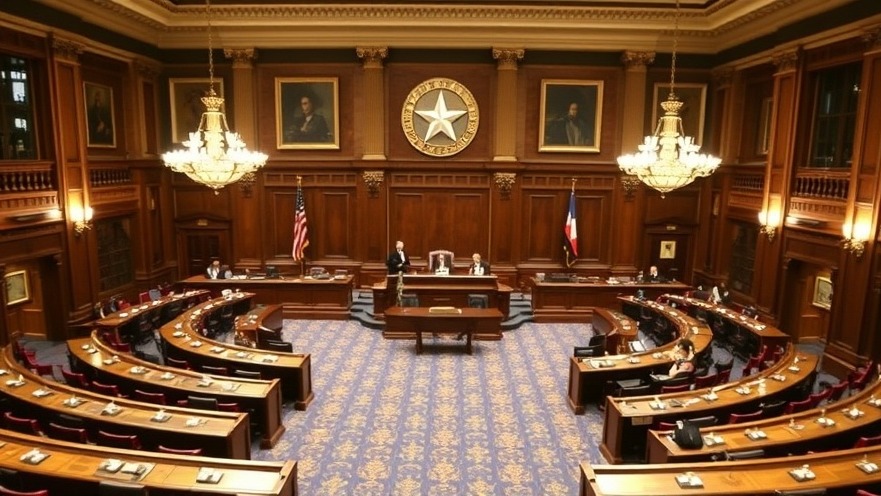
Texas GOP's Decision to Block Lawmakers from 2026 Primary Ballot: What It Means
The political landscape within the Republican Party of Texas is witnessing a significant shift as the party prepares to consider a new rule that could potentially block certain incumbents from the 2026 primary ballot. This unprecedented move, which is being termed as a test of 'Rule 44', is aimed at holding lawmakers accountable to the party's defined conservative principles.
This Saturday, the governing board of the Texas GOP will meet to deliberate the potential censure of ten state representatives deemed insufficiently conservative. The backdrop of this decision lies in the dissatisfaction among grassroots activists who believe their legislative priorities were undermined during the recent session. State representatives including House Speaker Dustin Burrows and several members of his leadership team could face repercussions, indicating a significant change in the governance of Texas politics.
Understanding Rule 44: The Mechanics Behind Censures
Rule 44 was born out of escalating frustrations among GOP activists, particularly highlighted during the Republican Party's 2024 convention. Initially created in 2016, the rule allowed for censuring officials who were found to violate the party's platform. The recent expansion of this rule now permits officials to be barred from running in the primary if they received a censure within the last two years. This measure is indicative of a party increasingly willing to distance itself from those it considers 'RINOs' or 'Republicans in Name Only.'
The new enforcement mechanism intends to strengthen ideological adherence among GOP lawmakers, as the party seeks to define what it means to be a Republican in Texas. Activists are asserting that representatives who do not align with their conservative priorities can be stripped of their right to run in subsequent elections, a tactic that has raised eyebrows among some party members and critics alike.
Censures: A Double-Edged Sword
The potential censuring process is seen by many as a double-edged sword. While it may empower grassroots activists within the party, critics assert that this weaponization of rule enforcement could further alienate moderate Republicans and lead to a toxic political environment. Key figures within the party, including SREC member Rolando Garcia, have voiced concerns regarding the potential misuse of this power, cautioning that such measures should only be reserved for severe violations.
Historically, censorship within the Texas GOP has been reserved for the most egregious violations of party principles, such as opposing core tenets of legislation. However, the current atmosphere suggests a willingness to lower the threshold for what constitutes a punishable offense. This shift raises questions about the future of bipartisanship and political cooperation as party members navigate their positions within an increasingly polarized executive framework.
The Bigger Picture: Implications for Texas Politics
With the upcoming meeting poised to set a precedent, the implications for Texas politics are profound. Will this power to censure legislators deter future representatives from making moderate choices? Or will it push potentially effective politicians out of the Republican fold, inadvertently leading to even greater party fragmentation?
The tensions emerging from this situation echo a broader national concern about how political parties engage with their members and the electorate at large, suggesting that the Texas GOP's decision could serve as a template for other state parties grappling with similar issues across the U.S.
Local Reactions and National Attention
The debate surrounding this novel approach to accountability is drawing attention from both state and national observers. With GOP leaders like Governor Greg Abbott and former President Donald Trump previously expressing support for leadership transitions, their positions could sway party dynamics as well. The county parties seem eager to capitalize on this newly defined path, marking a significant departure from previous methodologies that embraced moderation.
As the fallout from this proposed censure unfolds, Texas citizens and political observers alike will be closely monitoring the GOP’s actions. What happens at this meeting could not only influence upcoming elections but also reshape the political narrative as it relates to conservative governance in the Lone Star state.
Concluding Thoughts: What’s Next for Texas GOP?
As thousands prepare to cast their votes and weigh in on the evolving political dynamics, one thing is clear: the future of the Texas GOP lies in a delicate balance. Will this acute focus on ideological purity enhance the party’s appeal, or will it stunt growth and alienate vital moderates? Only time will tell, as the Texas GOP stands on the precipice of potentially monumental changes that will dictate its direction for years to come.
 Add Element
Add Element  Add Row
Add Row 



Write A Comment